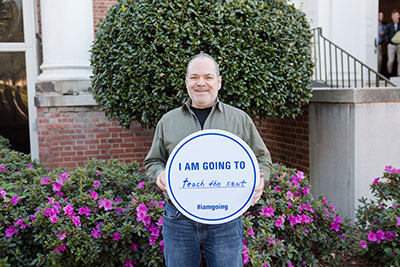Faculty Q&A with Ivan Spencer
January 19, 2017

 Ivan Spencer is a Professor of History and Philosophy at The College at Southeastern. He shares about his work at the college and his new book, “Tweetable Nietzsche,” being published on November 1, 2016.
Ivan Spencer is a Professor of History and Philosophy at The College at Southeastern. He shares about his work at the college and his new book, “Tweetable Nietzsche,” being published on November 1, 2016.
1. Tell us about yourself.
Born and raised Texan, but I now call North Carolina home after 20+ years. I earned my bachelor’s and master’s degrees from The Criswell College in Dallas and my doctorate at The University of Texas at Arlington. I also invested much missionary time among indigenous peoples deep in the Sierra Madres of Mexico.
I am happily married, with two grown daughters.
2. How did you come to SEBTS?
While in my Ph. D. studies, Dr. Paige Patterson, Dr. Danny Akin, and Dr. Keith Eitel moved from Texas to SEBTS in North Carolina. Dr. Patterson, knowing about my doctorate in philosophy, offered me a teaching post at the new college he started at SEBTS. We came here in 1996 and I finished my doctorate in 1997.
3. When people ask you, “What do you do at Southeastern,” what is your response?
“I am a professor and I teach,” because that’s easy to understand. Of course they’ll ask what I teach, so I say, “the history of ideas and philosophy.” The history of ideas is not easily understood. I explain that it’s the genealogy of influential intellectual ideas in the Western world.
4. On what are you currently working?
I recently wrote a book titled “Tweetable Nietzsche.” It will be out on November 1. The book is a mash up of three ingredients. First it is a simple introduction to philosophy for those who have no background in philosophy. Second, it promotes a worldview understanding. Last, it tweets quotes from Nietzsche as a case study in philosophy and worldview to reveal the profound influence of Nietzsche on our current society.
5. What have you been reading recently?
I am typically reading about what I’m researching. Grist for my mill comes from many areas. I’ve been reading “The Swerve” by Stephen Greenblatt, “Cosmos and Psyche” by Richard Tarnas, and “The Ascent of Money,” which is a history of money and financial history, by Niall Ferguson. One simply can’t have or read too many books!
6. When you get home from work, what do you look forward to doing?
I have been known around here as a coffee roaster for nine years. I enjoy an exquisite cup of single-origin coffee, preferably siphon-brewed. I love this hobby because I can share it. I also do various activities like art, going to the gym, playing racquetball and hiking when I have more time.
7. Who are your role models?
One of the most important role models in my life growing up was my grandfather. He left a positive legacy for me to follow in family and faith.
Also, my dad and my mom are both big role models for me. I have learned a lot from my mom’s faith and her sense of service. My dad and I spent a year in a remote area of Mexico together, planting churches and spreading the gospel.
When it comes to academics, David Dockery had a huge impact on me as a young scholar and thinker, and Dr. Patterson did as well. Many authors come to mind such as Augustine, Lewis, and Francis Schaeffer.
8. What has God been teaching you lately?
He is teaching me to be more gracious to everybody, to try to understand them. You just don’t know what experiences others are going through until you try to listen. I’ve been through a lot of difficult times in the last five years; there are a lot of big surprises that life throws at you that are very unpleasant. So the Lord’s been leading me to be more forgiving of everyone, to give people the benefit of the doubt. Another major lesson I’m learning is to simply encourage everyone I can. Many students really need encouragement.
9. When a student completes your class, what do you want him or her to walk away with at the end of the semester?
I hope they grasp a greater understanding God’s character and what he has done throughout history and understand that he is in control. Intellectually, I hope they know the sequence of ideas that have led to our current situation.
10. We always say that every classroom at SEBTS is a Great Commission classroom. What does that look like for your class?
The Great Commission context differs for each course. At the end of the History of Ideas course I ask students write and discuss an essay connecting the course to the Great Commission. With Church History Survey, I highlight the importance of missions and how whole swaths of the world look different today because of Christian missionaries.